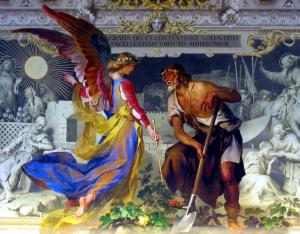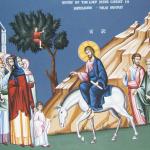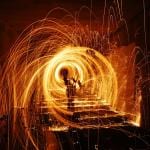
“God has taken his place in the divine council; in the midst of the gods he holds judgment “ (Ps. 82:1 RSV). If there is but one God, how can God be in the midst of the gods? Because Scripture sometimes designate people as gods if they find themselves united with God. They are gods, not by nature, but by grace. This is because, as Paul says, “But he who is united to the Lord becomes one spirit with him” (1 Cor. 6:17 RSV). Thus, Origen indicated that one way to interpret this text (there are certainly other, complementary ways to read it) is to see it as a representation of the faithful when they come together to worship God:
This gathering, when we genuinely are gathered, if we do not walk in a human manner, if we do not sow in the flesh what God speak about in “Your harvest of corruption,” and if we do not do the works of the flesh but the fruits of the spirit, it is not a gathering of human beings, but a gathering of the gods; the devil can do nothing; but God visits, and he visits standing in the midst of the gathering of the gods. Therefore, it is said, “God stood in the gathering of the gods.”[1]
Hence, God’s divine power is given over to us so that if we apprehend it, we can be said to be partakers of the divine nature:
His divine power has granted to us all things that pertain to life and godliness, through the knowledge of him who called us to his own glory and excellence, by which he has granted to us his precious and very great promises, that through these you may escape from the corruption that is in the world because of passion, and become partakers of the divine nature ( 2Ptr. 1:3-4 RSV).
We become gods by grace, not by nature. That is, we are deified by grace, for it is by such grace we become children of God. “I say, ‘You are gods, sons of the Most High, all of you’” (Ps. 82:6 RSV). We cannot comprehend the nature of God, for it infinitely transcends our potential. Nonetheless, we can comprehend God’s grace, for grace is given to us in such a form that we can receive it into ourselves and unite with it. Grace comes from God, is of God, and so is not other than God, but yet, because it comes to us in a form which we can comprehend, it is not what God is by nature. It is the uncreated energy of God. And so, when we receive it, we receive God. Where God’s grace is found, God is truly found. Through it, we are lifted up and become deified, so that we can truly be called gods:
For all the virtue we can attain and such imitation of God as lies in our power does no more than fit us for union with the Deity, but it is through grace that this ineffable union is actually accomplished. Through grace God in His entirety penetrates the saints in their entirety, and the saints in their entirety penetrate God entirely, exchanging the whole of Him for themselves, and acquiring Him alone as the reward of their ascent towards Him; for He embraces them as the soul embraces the body, enabling them to be in Him as His own members.[2]
Grace, then, and not God’s nature, is what deifies us. This grace is God. Wherever it is, God is, but it is God in relation to the way God condescends to act toward us so that we can apprehend the divinity and in that apprehension join ourselves to the divine life. In itself, as God is one, the activity of God is one, and one with the divine nature, for God is truly simple. But what we apprehend is a diversity of activities and qualities which truly come from God, and are not other than God, but is God in economic activity. The economic activities of God are not other than God, even if the absolute, immanent nature of God transcends what we can apprehend through God’s activities (energies).
Through the activities or energies of God, we truly come to know about God. What we come to know, we can engage. What we engage, we can unite with. As we unite with the uncreated energies of God, we find the various qualities and characteristics attributed to God become a part of who and what we are.
Since the uncreated energies of God are one with the divine nature, and God is simple, through those energies we can truly be said to be partakers of the divine nature, even though what we apprehend is not the divine nature as it is in itself but as it is presented to us in the economic activity of God. It is important that we realize our theosis is about the way we become gods by grace, not by nature. That is, our theosis, our deification, will make us like God while still being distinct from the divine nature (cf. 1 Cor. 13:12; 1 Jn. 3:2).
St. Maximos the Confessor reflected upon this truth, not only in relation to the divine nature of the Trinity , but in relation to the various persons of the Trinity. The Logos is one, incomprehensible, and according to its nature, it is incapable of being participated in, because its nature is the divine nature which transcends creaturely comprehension. On the other hand, the Logos acts in such a way to be participated in by creation, so that the one Logos is encountered in and through many logoi, logoi which remain truly one even though are apprehended as a diversity by us. These logoi reflect the working of the Logos (the energies of the Logos) which we use to apprehend and unite with the Logos, even as we use them to explain the various qualities of the Logos:
When, however, we exclude the highest form of negative theology concerning the Logos – according to which the Logos is neither called nor considered, nor is, in His entirety, anything that can be attributed to anything else, since He is beyond all being, and is not participated in by any being whatsoever – when, I say, we set this way of thinking aside, the one Logos is many logoi and the many are One. According to the creative and sustaining procession of the One to individual beings, which is befitting the divine goodness, the One is many. [3]
The One is many and yet one. God is One, and the uncreated energy of God is one in relation to the eternal activity of the One God in the immanent Trinity. But that uncreated energy is experienced by us in a diversity of ways, so that the logoi can be said to represent many energies of the Logos, even though those energies are, in reality, one. Through them, we truly encounter God, both in relation to the divine nature, but also in relation to the Trinitarian persons of God. We apprehend the Logos through the working of the Logos, the working which is one and yet many as the serve as the foundation for creation. Thus, in our deification, we can be said to join in and unite ourselves with the various logoi of the Logos:
In such a person the apostolic word is fulfilled, which says: In Him we live and move and have our being, for he comes to be “in “ God through attentiveness, since he has not falsified the logos of being that preexists in God; and he “moves” in God in accordance with the logs of well-being that preexists in God, since he is moved to action by the virtues; and he “lives” in God in accordance with the logos of eternal being that also preexists in God. In this life he has already become one with himself and immovable, owing to his state of supreme impassibility, and in the age to come, through the divinization which will be given to him, he will love and cleave affectionately to the aforementioned logoi that preexists in God, or rather he will love and cleave affectionately to God himself, in whom the logoi of beautiful things are steadfastly fixed.[4]
We are deified in and through the Logos in relation to the incarnation, so that as much as God the Logos is kenotically emptied for our sake, we find ourselves lifted up and deified. “The Incarnation of Christ accomplishes the unification of divine and creaturely life, of man’s deification, which is precisely the power of the heavenly Church manifested in the earthly Church.”[5] But this must not be used to dismiss the role of the Spirit in our deification. The Spirit dwells in us, revealing itself through its many activities or gifts; we are deified by the Spirit in the way we partake of those gifts, seeing that they are the uncreated energies of the Spirit which we apprehend. The Logos with the Father sends the Spirit to us so that we can then dwell in the Spirit and join in with the gifts of the Spirit, the energies of the Spirit, and through them, find ourselves divinized:
In those whom the first mode of birth is observed, it happens that – because of the disposition of their will has not yet been fully extracted from its passionate fixation on the flesh, and because they have not been completely imbued by the Spirit with active participation in the divine mysteries that have taken place – it happens, I say, that their inclination to sin is never very far away for the simple reason that they continue to will it. For the Spirit does not give birth to a disposition of the will without the consent of that will, but to the extent that the will is willing, He transforms and divinizes it. Whoever has shared in this divinization through experience and knowledge is incapable of revering from what he, once and for all, truly and precisely became cognizant of in actual deed, to something else besides this, which merely pretends to be the same thing – no more than the eye once it has seen the sun, could ever mistake it for the moon or any of the other stars in heaven. [6]
We do not become what the Spirit is by nature, just as we do not become what the Logos is by nature. Deification allows us to truly live and thrive in the Logos and in the Spirit. As the Logos and the Spirit are the two revealing arms of the Father, coming to us to lift us up and deify us, in and through them, in and through our union with the Logos and the Spirt, we are rendered adopted children of God and so engage and partake of the Father through the various activities of the Father towards us. We find ourselves, through the Logos and the Spirit, participating in the divine life, experiencing and enjoying the love which is God. Since our deification is through the uncreated energies of God, there remains a distinction between what God is by nature and what we become in our union with God. Thus, we must conclude that the distinction which Eastern theologians make between the nature and energy of God is logically necessary if we are not going to conflate theosis with a monist absolutism which annihilates all differences between God and creation.
[1] Origen, Homilies on the Psalms: Codex Monacensis Graecus 314. Trans. Joseph W. Trigg (Washington, DC: CUA Press, 2020), 440 [Homily Psalm 81].
[2] St. Gregory Palamas, “The Declaration of the Holy Mountain in Defense of Those Who Devoutly Practice a Life of Stillness,” in The Philokalia: Volume IV. Trans. and ed. G.E. H. Palmer, Philip Sherrard, Kallistos Ware, et. al. (London: Faber and Faber, 1995), 421 [#2].
[3] St. Maximos the Confessor, On the Difficulties in the Fathers: The Ambigua. Volume I. ed. and trans. Nicholas Constas (Cambridge: Harvard University Press, 2014), 101 [Amb. 7].
[4] St. Maximos the Confessor, On the Difficulties in the Fathers: The Ambigua. Volume I., 105 [Amb. 7].
[5] Sergius Bulgakov, Bride of the Lamb. Trans. Boris Jakim (Grand Rapids, MI: William B. Eerdmans Publishing Company, 2002), 257.
[6] St. Maximos the Confessor, On Difficulties in Sacred Scripture: The Responses to Thalassios. Trans. Fr. Maximos Constas (Washington, DC: CUA Press, 2018), 108-9.
Stay in touch! Like A Little Bit of Nothing on Facebook.
If you liked what you read, please consider sharing it with your friends and family!












